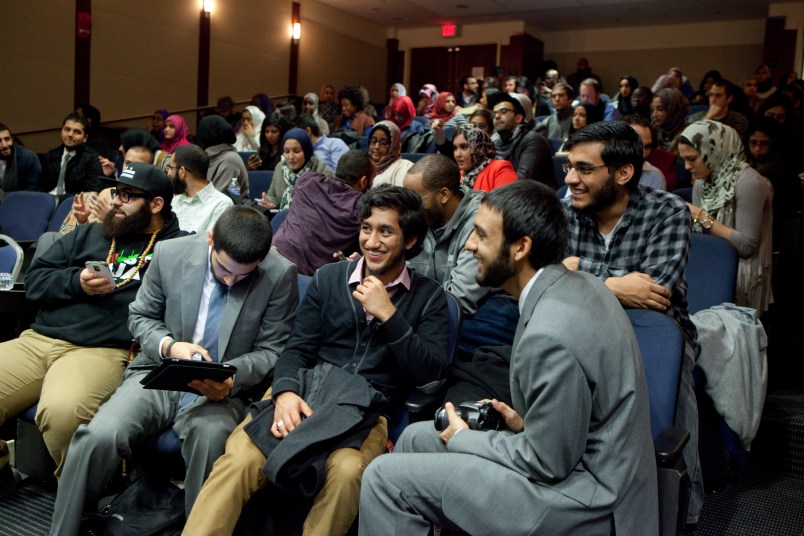Muslim Americans need to try harder, according to Donald Trump, to “assimilate” within the United States. There’s just a big issue with Trump’s assumption. American Muslims already are well integrated, social science shows.
In an interview with Fox News’ Sean Hannity Monday night, Trump claimed that “Assimilation has been very hard. It’s almost. I won’t say nonexistent, but it gets to be pretty close.”
“And, I’m talking about second and third generation for some reason. There’s no real assimilation,” Trump said.
To begin with, researchers reject Trump’s premise.
Dalia Mogahed, the director of research at the Institute for Social Policy and Understanding, said that Trump’s claim that Muslim Americans needed to “assimilate” assumed that Islam was somehow a new arrival, which is wrong.
“What Trump is doing by so strongly alienating Muslims from the American identity is actually increasing the psychological space for groups like ISIS and making people possibly more vulnerable to listening to that type of propaganda,” Mogahed said. “Alienating American Muslims from their American identity is actually about the most dangerous thing he could do.”
“Assimilation,” social scientists said, isn’t even the preferred term. They prefer “integration,” a term that suggests one can still maintain his or her own cultural identity even as they become part of a broader community.
Even accepting Trump’s flawed premises, social scientists still point out he is wrong that Muslim Americans are not well integrated.
“Does being an American mean a certain religious and cultural background,” asked Mogahed. “Or, is being an American a set of ideas and ideals and values that were set forth by our founding fathers? If it is the later, Trump is very UnAmerican and he needs to work on integrating.”
Data over the years from Pew, Gallup and the Institute for Social Policy and Understanding, collectively paint a picture of a Muslim faith that doesn’t deter individuals from integrating into communities – some of which they have resided in for decades. If anything, data shows, a strong engagement in the Muslim faith correlates with higher civic engagement.
“Muslims who regularly attend mosques are more likely to work with their neighbors to solve community problems, be registered to vote, and are more likely to plan to vote,” researchers wrote in a 2016 study by the Institute of Social Policy and Understanding, which surveyed more than 500 Muslims in the United States as well as Jewish and Christian Americans.
Mogahed, who also studied Muslim American patterns previously at Gallup, adds that her research has shown Muslim Americans have more confidence in the judicial system than any other faith communities. And, the majority of American Muslims, according the the survey, reported they don’t believe that religion should have any place in how the law is adjudicated. Among those who do believe religion should play a role in the law (37 percent), there was a larger number of Protestants (41 percent) who felt the same way.
“It is a story, really, of a community that believes very strongly in American ideals and gives back to America in their professional and their philanthropic contributions,” Mogahed said pointing specifically to another report she contributed to that showed the leadership role American Muslims had in helping uncover the lead water crisis in Flint, Michigan.
“If that doesn’t say integration… ” Mogahed said.
A 2011 Pew Research study found that 56 percent of Muslim Americans reported that fellow Muslims coming to the United States wanted to “adopt American customs and ways of life.” (In contrast, only 33 percent of Americans as a whole thought that Muslim Americans wanted to assimilate, according to that same study.)
When it comes to the traditional markers of the so-called American dream, the Pew survey showed that Muslim Americans were just as likely to achieve them as other Americans. Muslim Americans are just as likely to have graduated from college. They are just as likely to have an annual household income of above $100,000. They are self-employed or own their own businesses at the same rate as other Americans.
“Comparable percentages say they watch entertainment television, follow professional or college sports, recycle household materials, and play video games,” Pew reported.
A 2009 Gallup survey found that Muslim American women were among the most educated in the country, second only to Jewish American women.
The 2011 Pew report found that 63 percent of Muslims in the United State were first-generation immigrants, but Muslim Americans were more likely to become citizens of the United States than other immigrant groups. Eighty-one percent of Muslim Americans are citizens, including 70 percent of those born outside of the United States.
Shadi Hamid, a senior fellow at the Brookings Institution and the author of the recently released Islamic Exceptionalism: How the Struggle Over Islam Is Reshaping the World, was initially flummoxed when asked for data on Muslim American integration.
“It is hard for me to point to one thing,” Hamid said, “because it seems self evident that his statements are incorrect.”







News Flash: Donald Trump Spouts Bilious Crap Out of his Jaw-Hole.
Film at Eleven.
Facts schmacts. Phffff. You can use facts to prove anything. -H.S.
Donnie is basing his opinion on his known facts…
the failure of Trump Steaks was absolutely traced to the inadequate orders from the muslim community as was the failure of Trump Wine…
“It is hard for me to point to one thing,” Hamid said, “because it seems self evident that his statements are incorrect.”
Understatement: (noun) See above.
I really want a reporter to show The Rump this picture. He owes the world an explanation whether the gentleman on the right was assimilated enough.